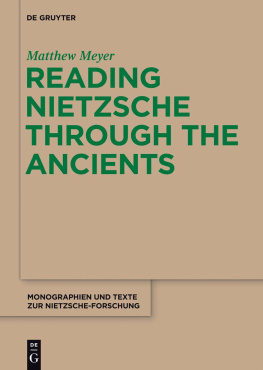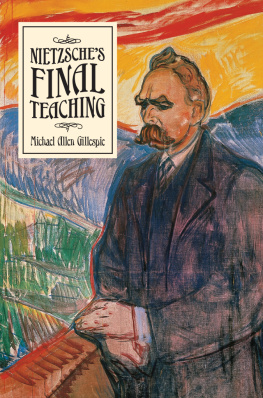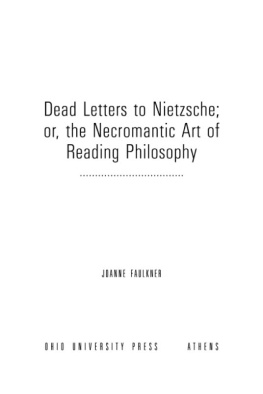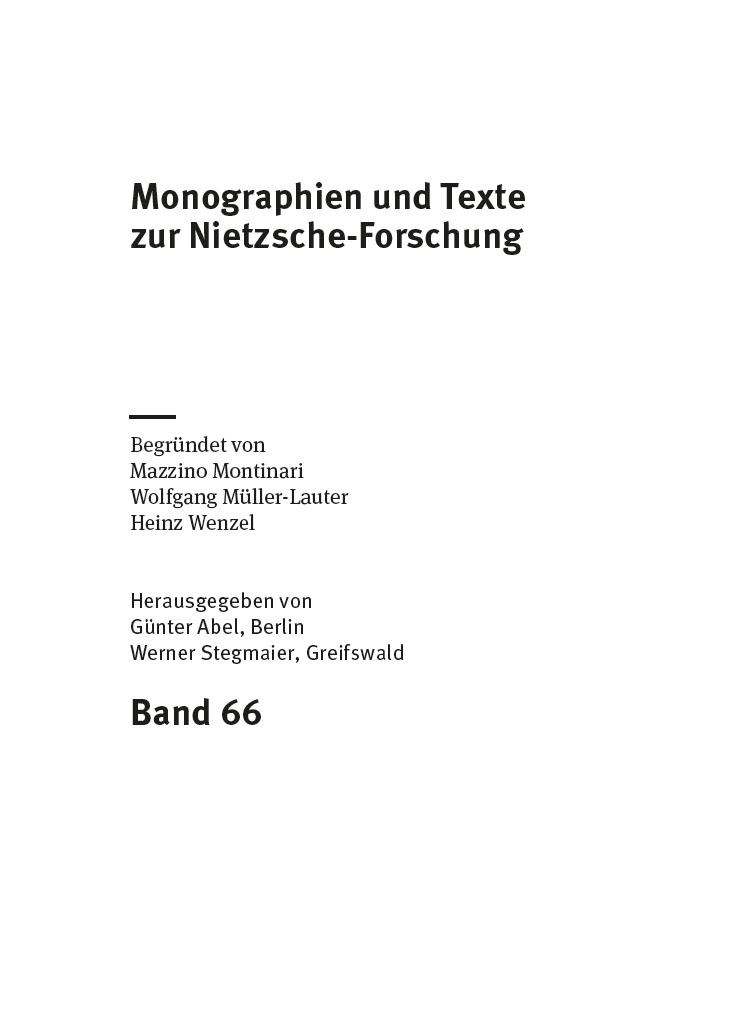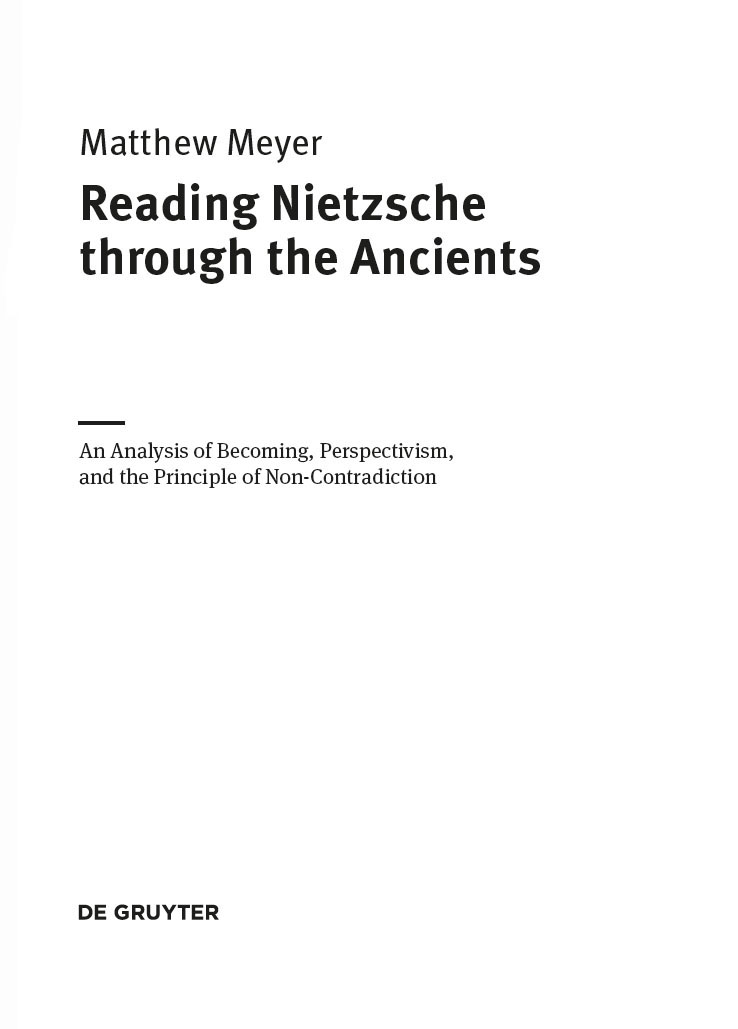Preface and Acknowledgements
This work is the product of what has become years of study of Nietzsches philosophy and his texts. These reflections were initially guided by a number of professors in a variety of seminars at Harvard University, and they continued, first, during my time as a Frederick Sheldon Fellow (from Harvard University) and then as a graduate student and lecturer at the University of Vienna. My work has since taken me to Boston University, both as a graduate student and then as a lecturer, and now to the University of Scranton as a member of the philosophy department. If memory serves me correctly, I came to Nietzsches work interested in studying two questions: First, I wanted to explore the foundations of so-called postmodern thought a hot topic in the 90s and I was convinced that Nietzsche was the source of these ideas; second, I was interested in Nietzsches relativism and how his relativism may or may not be consistent with what seemed to be a dogmatic rejection and condemnation of the Judeo-Christian-Platonic tradition. Although I was searching for quick solutions, I soon came to realize that if I was going to answer these and other questions, I needed to get a better sense of the scope, trajectory, and aim of Nietzsches overall project and, moreover, how his various works, published and unpublished, might fit together, if at all. In other words, I soon learned that if I was going to understand Nietzsche and ultimately answer the questions that I brought to his texts, I needed to approach his work through the concerns that animated his thought, not my own, and doing this meant going back to his studies of antiquity, reading the sources of his philosophy, knowing his intellectual context, learning German and even ancient Greek, and so on. In short, it meant spending the years that it has taken to write this book.
There are many people who have contributed to the production of this work and my development as a philosopher, scholar, and teacher, and I cannot hope to thank everyone here. There are, however, some people whose influence and support have been crucial for making this project a reality. The first is Michael Degnan who introduced me to philosophy at the University of St. Thomas. I will never forget the joy of learning modus ponens and modus tollens and reading both Plato and Aristotle in my first encounter with philosophy. Had I not been required to take philosophy as an undergraduate and had I not had the unforgettable experiences in those first philosophy courses, this book would have never been written.
Worthy of mention are also the professors at Harvard, in particular Alison Simmons, who supported my application for the Frederick Sheldon Fellowship that sent me to Vienna for what became more than a year of study. During my studies at the University of Vienna, I met a number of people who helped me in innumerable ways. I would especially like to thank Barbara Salaquarda for her assistance upon arriving in Vienna, Johann Figl and Hans-Gerald Hdl for their academic advice and support during my studies, and Martin Liebscher, Alfred Dunshirn, Kurt Appel, Jakob Dellinger, and Peter Klien for their friendship and conversation about philosophy in general and Nietzsche in particular. I would also like to thank Daniel Conway for encouraging me to finish my graduate studies in the United States and for supporting me as I applied to doctoral programs.
At Boston University, there are a number of people who played a key role in my education. Special thanks go out to Daniel Dahlstrom for agreeing to advise my project and for his continued support after I graduated from Boston University. Thanks to Stephanie Nelson, Rainer Friedrich, and Stephen Scully for helping me through my studies of ancient Greek. And thanks to David Roochnik, Gisela Striker, and Bernard Reginster for serving as members of my dissertation committee.
I was also able to present the various ideas expressed in this work at annual conferences and workshops, and I would like to thank the hosts of and the audiences at the Nietzsche Werkstatt in Schulpforta, the conferences of the Friedrich Nietzsche Society, the APA meetings of the North American Nietzsche Society, the Eastern Division of the American Society for Aesthetics, and the Princeton Ancient Philosophy Graduate Conference for these wonderful opportunities. A special thanks also goes out to Helmut Heit and Anthony Jensen for inviting me to participate in the Berlin conference on Nietzsche and antiquity. Finally, thanks to my editors at de Gruyter, Michiel Klein-Swormink, Christoph Schirmer, and Axel Pichler, for their assistance in moving this manuscript to publication and to the readers of my manuscript, in particular Werner Stegmaier, for ensuring that my work addresses an international readership.
I would also like to thank my colleagues at The University of Scranton for providing a welcoming and supportive environment since my arrival. There are too many to mention here. However, I would like to thank Daniel Haggerty, Crina Gschwandtner, and Clark Wolf for reading my work and giving helpful feedback and advice on the chapters that follow. Moreover, I am grateful to the administration at The University of Scranton for awarding me the Faculty Development Grant so that I could pursue this project over the summer months. Finally, I would like to thank my family, especially my wife Renata, for their support and understanding through the many years of my studies and the many hours I spent laboring on this project. Without them, this work would not have come to fruition.
Scranton, PA, 8 August 2013
Matthew Meyer
Abbreviations
Primary sources from Nietzsche and Schopenhauer are cited in the main text by abbreviation according to the standard conventions listed below. For the sake of consistency, I refer to the titles of Nietzsches and Schopenhauers works and their abbreviations in English. Classical texts are also cited in the main text by standard abbreviations and corresponding page and line numbers. For any German text that has not been translated, I refer to the original title. Otherwise, I refer to the translated title.
Works by Nietzsche
Nietzsches works are typically cited by section number and, in the cases of EH, GM, and TI, an additional reference to the chapter title or essay number (see below). References to Z include the part number and chapter title (often abbreviated), e.g., (Z I Reading). Prefaces of works are referenced by a Preface after the abbreviated title. In cases where there are no section numbers, page numbers are used instead, indicated by the p. preceding the page number. All passages from WP are cited by section number and the corresponding note from Nietzsches Nachlass in KSA. In cases where a Nachlass note is not in WP, only KSA is cited and the translation is, unless otherwise noted, my own. In citing KSA, I begin with a reference to NL and then provide the volume number, followed by the manuscript number, and then the fragment number in brackets, e.g., (NL, KSA 7, 5[103]). When volume 14 of KSA is cited, only page numbers are referenced (indicated by the p.). I cite Nietzsches letters according to volume and letter number as they appear in KGB, e.g., (KGB III/1, Bf. 213). In some cases, I abbreviate longer titles of works when they appear in the main text.

